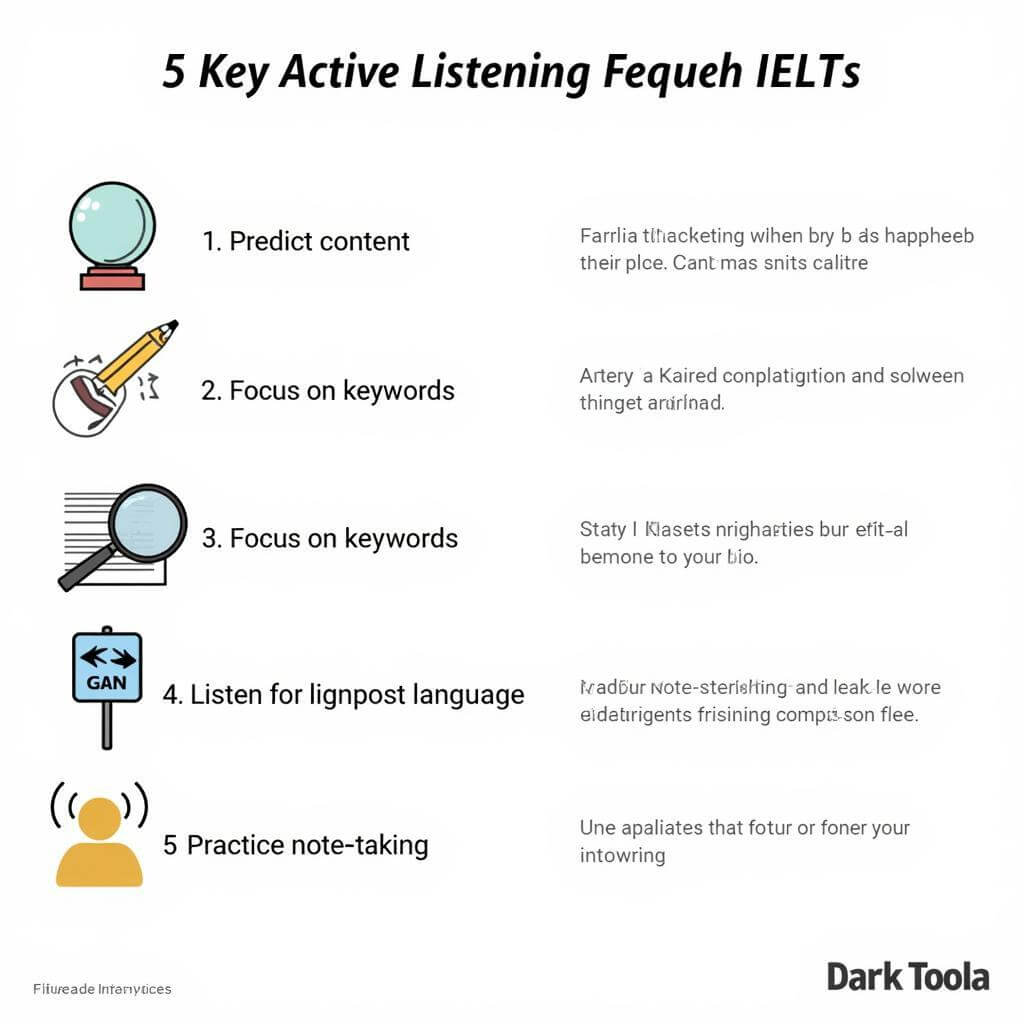IELTS Listening can be challenging, especially when it comes to focusing on specific details. This crucial skill can make a significant difference in your overall score. As an experienced IELTS instructor, I’ll share proven strategies on how to focus on specific details in IELTS listening, helping you achieve your desired band score.
Understanding the Importance of Specific Details in IELTS Listening
Before diving into strategies, it’s essential to recognize why focusing on specific details is vital. In IELTS Listening, you’ll encounter various question types that require pinpoint accuracy, such as:
- Multiple choice
- Matching
- Sentence completion
- Short answer questions
- Focusing on specific speaker details
Each of these question types demands careful attention to specific information within the audio. Let’s explore how to sharpen this skill effectively.
Developing Active Listening Skills
Active listening is the foundation for focusing on specific details in IELTS Listening. Here are some techniques to enhance your active listening:
- Predict content before listening
- Focus on keywords and phrases
- Listen for signpost language
- Pay attention to intonation and stress
- Practice note-taking techniques

Strategies for Focusing on Specific Details
Now that we’ve covered the basics, let’s delve into specific strategies to improve your focus during the IELTS Listening test.
1. Pre-listening Preparation
Before the audio begins, take advantage of the time given to:
- Read questions carefully
- Underline key information
- Predict possible answers
- Identify question types
This preparation will prime your mind to focus on the relevant details when listening.
2. Listen for Synonyms and Paraphrasing
IELTS often uses synonyms or paraphrases of words in the questions. Train your ear to recognize these variations:
- Practice with synonyms lists
- Listen to various accents and dialects
- Expose yourself to different ways of expressing ideas
“One of the most common mistakes IELTS candidates make is expecting to hear the exact words from the question paper. The key is to listen for meaning, not just specific words,” says Dr. Emma Thompson, IELTS examiner and language expert.
3. Utilize Visual Cues
Many IELTS Listening tasks include visual elements like maps, diagrams, or charts. Use these to your advantage:
- Familiarize yourself with the image before listening
- Use the visual as a reference point during the audio
- Practice active listening daily with visual aids
How to tackle map labeling questions in IELTS listening is a crucial skill that combines visual and auditory processing.
4. Develop Your Working Memory
Improving your working memory can significantly enhance your ability to focus on specific details:
- Practice memory games
- Use mnemonics for information retention
- Engage in dual-task exercises
- Build listening stamina efficiently
5. Master Note-Taking Techniques
Effective note-taking is crucial for capturing specific details:
- Use abbreviations and symbols
- Focus on content words (nouns, verbs, adjectives)
- Develop a personal shorthand system
- Practice with past IELTS papers
Common Pitfalls to Avoid
When focusing on specific details in IELTS Listening, be wary of these common mistakes:
- Fixating on missed information
- Ignoring context clues
- Failing to manage time effectively
- Overlooking singular/plural distinctions
- Misinterpreting numbers and figures
By being aware of these pitfalls, you can develop strategies to overcome them and improve your performance.
Advanced Tips for Mastering Specific Details
For those aiming for band 8 or above, consider these advanced techniques:
- Analyze speaker attitudes and opinions
- Recognize subtle differences in similar-sounding words
- Interpret implied meanings and cultural references
- Practice with background noise to simulate real test conditions
“The difference between a good and an excellent IELTS Listening score often lies in the ability to pick up on nuanced details and implied meanings,” notes Professor James Chen, IELTS researcher and trainer.
Conclusion: Putting It All Together
Mastering how to focus on specific details in IELTS listening is a skill that develops with consistent practice and the right strategies. By implementing the techniques discussed in this article, from active listening to advanced note-taking, you’ll be well-equipped to tackle even the most challenging IELTS Listening tasks.
Remember, the key to success lies in regular practice, self-assessment, and continual improvement. Stay focused, stay motivated, and you’ll see your IELTS Listening scores soar.
FAQ: Focusing on Specific Details in IELTS Listening
Q1: How can I improve my concentration during long listening passages?
A: Practice building listening stamina efficiently by gradually increasing the length of your listening sessions and using active listening techniques.
Q2: What should I do if I miss a specific detail during the test?
A: Stay calm and move on. Focus on the next question and use context clues to help with any questions you might have missed.
Q3: How important is accent familiarity in focusing on specific details?
A: Very important. Expose yourself to various English accents regularly to improve your ability to understand different speakers.
Q4: Can I write on the question paper during the listening test?
A: Yes, you can make notes on the question paper. Use this to your advantage by underlining key information and jotting down specific details.
Q5: How many times will I hear the audio in the IELTS Listening test?
A: You will hear the audio only once, which is why focusing on specific details from the first listen is crucial.
Q6: Are there any specific exercises to improve my ability to focus on details?
A: Yes, try exercises like ‘spot the difference’ in audio clips, practice dictation, and engage in focused listening tasks where you need to identify specific information.
Q7: How can I balance between listening for general meaning and specific details?
A: Practice alternating between listening for gist and for detail. Start with understanding the overall context, then focus on picking up specific information within that context.